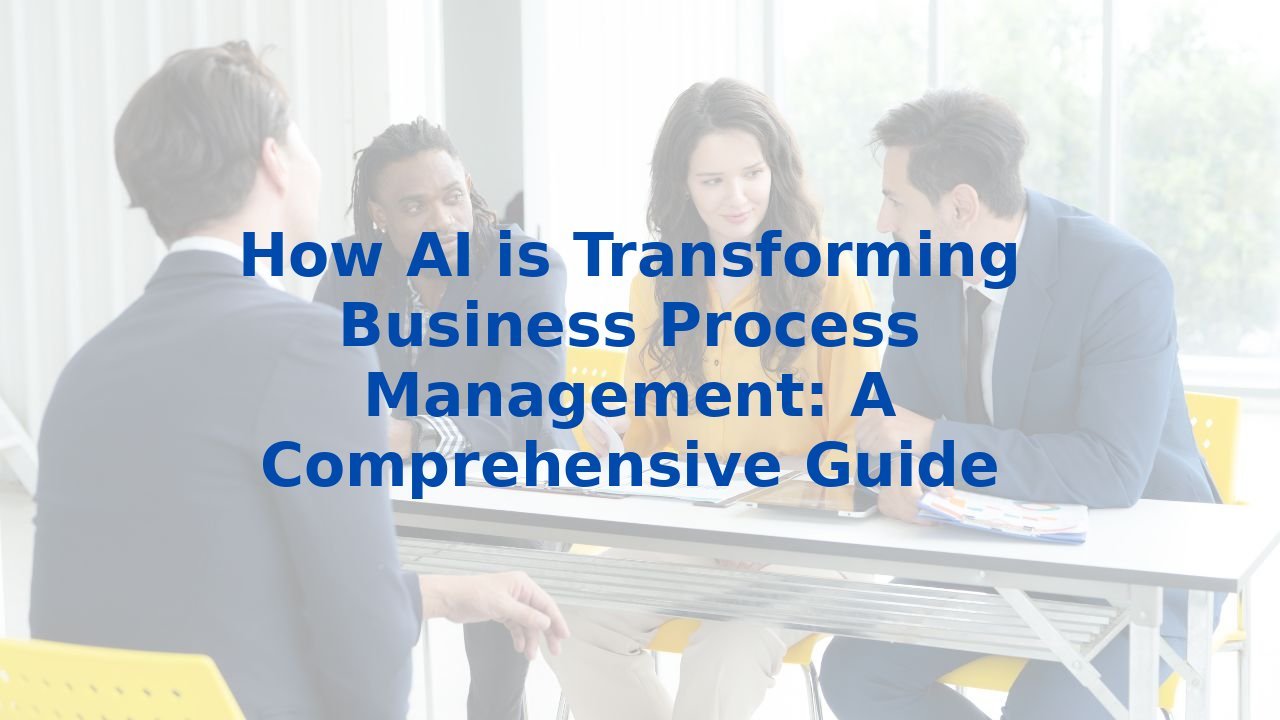How AI is Transforming Business Process Management: A Comprehensive Guide
How AI is Transforming Business Process Management: A Comprehensive Guide
In the rapidly shifting landscape of modern business, the way we manage and optimize processes is evolving dramatically. This evolution is largely driven by the integration of Artificial Intelligence (AI) into Business Process Management (BPM). As organizations strive for higher efficiency and productivity, AI stands as a pivotal enabler, redefining traditional methodologies and offering unprecedented enhancements to our business processes.
Understanding Business Process Management
Business Process Management is more than just a set of tools; it is a systematic approach aimed at managing and improving an organization’s processes. With its origins tracing back to the late 1980s, BPM has matured into a critical management framework that oversees everything from the design and execution to the monitoring of processes. Historically, BPM relied heavily on human oversight, which often created a breeding ground for inefficiencies and delays. Now, with AI entering the arena, we witness a shift towards sophisticated automation, enabling real-time monitoring and continuous process optimization.
How AI Enhances Business Processes
AI amplifies BPM in several transformative ways, automating routine tasks, enhancing data analysis, and providing actionable insights that were previously difficult to uncover. Let’s explore the core areas where AI makes an impact:
1. Process Discovery and Mapping
AI employs process mining and natural language processing to discover existing processes within a company. By doing so, it effectively highlights inefficiencies and identifies bottlenecks that traditional methods might miss. This capability sets the stage for more strategic improvements. Additionally, AI keeps process mapping up-to-date by continuously analyzing real-time data, ensuring documentation aligns with the current operational reality.
2. Process Automation
One of the most significant advantages of AI is its ability to handle repetitive, mundane tasks—think about employee onboarding or processing invoices. By automating these functions, organizations free up their human resources for more strategic initiative. But the innovation doesn’t stop there; AI can also facilitate complex processes that span multiple departments and systems. In industries like manufacturing, AI can monitor processes in real-time, pinpoint potential bottlenecks, and suggest timely corrections, leading to a seamless workflow.
3. Data Analysis and Visualization
AI excels at analyzing unstructured data, transforming it into insights that guide better decision-making. When paired with real-time monitoring capabilities, AI ensures organizations are equipped with the latest information on process status, effectively allowing teams to intervene as needed and optimize their operations.
4. Decision Support
With machine learning under its belt, AI rapidly identifies trends and patterns in historical data allowing for predictive analytics. This enables businesses to foresee future events and adapt their strategies accordingly. Furthermore, AI enhances the process design phase by providing guided assistance, recommending optimal components based on comprehensive business context.
5. Customer Engagement and Service
AI thrives in enhancing customer experience through intelligent solutions like chatbots and virtual assistants. Equipped with natural language processing, these AI tools manage inquiries and facilitate transactions, ultimately increasing customer satisfaction while reducing operational burden. Moreover, AI can continuously assess the quality of customer service interactions, ensuring standards remain high and that service optimization is an ongoing endeavor.
Benefits of AI in Business Process Management
The integration of AI delivers a rich mix of benefits, including:
- Improved Efficiency: Automation of repetitive tasks significantly reduces the time spent on manual processes.
- Enhanced Decision-Making: AI empowers organizations with data-driven insights that lead to informed decisions.
- Increased Accuracy: By minimizing human error, AI enhances the reliability of analyses and outcomes.
- Real-Time Monitoring: Organizations can monitor processes live, enabling timely interventions that enhance workflow.
Training Employees for AI
While the merits of AI in enhancing business processes are indisputable, an organization's success in this paradigm shift relies heavily on its workforce. Training employees to work harmoniously with AI tools is paramount. This training brings about a multitude of advantages:
- Adaptability: A workforce skilled in AI is better equipped to embrace new technologies and processes as they emerge.
- Efficient Collaboration: Trained personnel can seamlessly engage with AI systems, promoting smooth operational integration.
- Informed Decision-Making: Equipped with knowledge of AI capabilities, employees can better interpret insights and enhance decision-making processes.
Conclusion
The intersection of AI and Business Process Management marks a significant milestone in how organizations operate. With AI automating tasks, enhancing data analysis, and providing actionable insights, the emphasis on efficiency and productivity has never been clearer. However, for companies to fully unlock these benefits, investing in employee training is equally crucial. Embracing AI is not merely about technology; it’s a holistic approach that encompasses people, processes, and strategies, steering organizations toward sustained success in a dynamic business environment.
Discover more about the transformative power of AI and how to bring your organization into the future by exploring Complete AI Training resources today.



